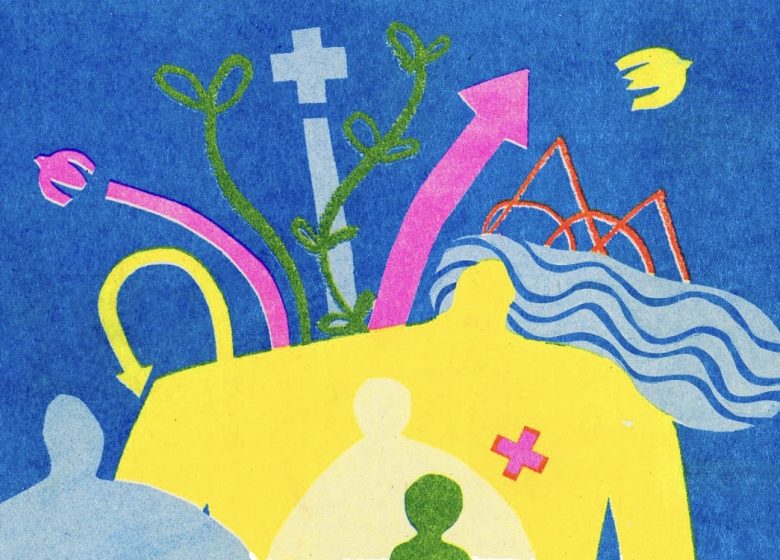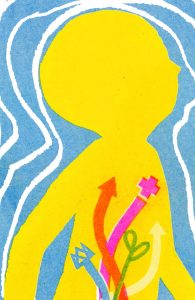Unlocking Creativity at the Intersection of Health and Climate Change: My Role as Cultural Producer at Net+
- Posted on: 1 September 2025

Copyright Caroline Pedler 2025
We asked Annie Sheen, our resident Cultural Producer, to talk about her unique role at the Net+ Centre. Below, she shares insights into why creative processes and engagement with the arts are essential in a research context.
As Arts and Cultural Producer, I collaborate with artists, arts organisations, and communities to bring creative projects to life.
This is my first time being embedded within a specific research centre, and I’m thrilled by the opportunity. Alongside this role, I continue to work within the Arts and Culture team at the University of Exeter.
At Net+, I help to manage all the arts-based elements of the Centre’s work. From embedding creative practice across every stage of research to exploring how it can support our interdisciplinary community of practice. My role is to help staff think about how arts and culture can add value to their work.
Why Creativity Matters in Research
Creativity fuels our ability to generate new ideas, collaborate effectively, respond to the world around us, and explore solutions to complex problems. This is at the heart of what all researchers do—so I believe it’s essential that creativity is nurtured regularly within a research context.
Professional artists are expansive thinkers: when given the time to dive deeply into a subject, they ask questions that push boundaries and pull at new threads of enquiry. I’ve seen how bringing an artist into a research space can be genuinely transformative for the academics involved.
We will be offering three Creative Fellowship opportunities during the next 4 years. These offer short-term placements to creative practitioners to encourage new conversations across disciplines.
That said, there are other ways to bring more creativity into your work. Regularly flexing your own creative skills is just as important. Creative practice can help us develop essential research skills such as divergent thinking, self-awareness and managing uncertainty. It also helps us to unpack our own subjective place within our work as well as prepare for pro-social engagement – both of which are essential for effective interdisciplinary collaboration.
“Developing creative confidence can unlock the creativity already inherent in every discipline and research method.”
Creativity is realised through embodied, interpersonal, and more-than-human engagement – it is so much more than an individualised process. Designed well, there can be great psychological safety in a collective creative process – in which it feels OK to take risks, talk about difficult things or explore difficult concepts. This can be very useful for a Research Centre such as Net+ where multiple disciplines, stakeholders and communities are wanting to work together to find net positive solutions to very complex problems. Through shared exploration and creative dialogue, we can approach problems in new ways, build communities of practice, and foster trust among partners and stakeholders.
Coupled with the overwhelming evidence that cultural engagement and artistic practice are fundamental to our physical and mental wellbeing, it’s clear why embedding creativity into Net+ Centre is not just valuable—it’s essential.
Like any skill, creative capacities need to be recharged and maintained to sustain us over the long term. Arts and Culture, University of Exeter recently worked with design agency Scriberia to produce this Creativity Guide, to support University colleagues on their creative journeys.
Creative Research Methods and Practice Research
There’s no agreed definition for arts-based research but creative methods can be used at all stages of the research process, offering a rich and varied resource to researchers of all disciplines.
“It is essential we move beyond arts and cultural activity being merely a vehicle for translation of scientific research.”
Creativity is sometimes conflated with art, but visual and performative methods are not the only tools available to us. Narrative-based methods such as field poetry, research using technology and even ‘crochet thinking’ in mathematics have been developed as robust approaches.
As we try to answer increasingly complex questions, we require multi-modal approaches to identify the breadth and depth of a problem. Using creative methods in research design can be very helpful – e.g. using visualisations and metaphors, creative writing or performative techniques, or design thinking principles to think through ideas. We can also think about including creative literature and creative outputs in our Literature reviews.
More and more researchers are finding creative approaches useful. Some choose to work with professional artists in the development and design of arts methods while others decide it is appropriate to implement the creative methods themselves. As long as you’re always attending to the quality of the creative process for the purposes of the research you can’t go far wrong.
Always remember, creative practice can be a form of research too, with the resulting artwork being a valid research output. See Home – The Hidden REF
Arts as a Catalyst for Knowledge Exchange
Humans are compelled to make art and experience culture.
Artists are constantly exploring urgent topics through new creative work which are performed, published, and exhibited across the country. Many are eager to collaborate with researchers to inform this work but may not know this door is open. At Net+ we want to facilitate equitable collaborations that can spark transformation – for both research and artistic creation – being mindful of when things might feel tokenistic or extractive.
The Centre for Cultural Value and the National Centre for Academic and Cultural Exchange (NCACE) are great resources to draw on here.
If we aim to work within a community, chances are there’s a grass-roots creative organisation nearby. Many artists and arts organisations are deeply embedded in their communities. Collaborating respectfully with these local networks provides access to knowledge, expertise, and connections—especially helpful when we want to engage underrepresented communities and co-produce research with them. I’ll be working closely with Jess Dicken, the Centre’s Public Engagement Fellow to think about how we utilise arts-based practice in our approach to public engagement.
Arts-based Presentation, Communication and Impact
Many of the challenges we face around climate and health ultimately come down to communication. One of the Centre’s key aims is to shift the discourse around climate change and strengthen the connection between environmental issues and human health.
Arts and cultural encounters challenge us to think, live, and act differently. (Take a look at Alicja Biala’s The Totemy Sculptures, Eve Mosher’s HighWaterLine Project and Justin Brice’s Solar Powered Art Installation Boards). They make seemingly far-fetched ideas tangible, even possible, and raise our collective appreciation and awareness to important topics in non-threatening and accessible ways.
Collaborating with artists and cultural organisations is a powerful way to explore research, share ideas, and reach new audiences. Over the first five years of the Centre, we hope to run at least two major art commissioning processes, giving artists the opportunity to create new work with communities and academics that challenges us all to think differently about the connections between climate and health.
We’re also interested in how we might use artistic approaches to inform policy development or create alternative policy outputs. The Wellcome Trust and the Government’s Policy Lab have some really interesting examples we can learn from and I’m looking forward to working with the Net+ Centre’s Task Force to explore how we do this.
Getting Started
When I started the role in April our first Annual Meeting was fast approaching. I was keen to embed creative practice into the agenda—and even more excited to bring some original artworks for everyone to take home.
We commissioned artist and illustrator Caroline Pedler to create three new postcard artworks for the Centre. Our brief for these three artworks was ambitious. We were excited to see how Caroline might use her signature collage practice to explore the intersection of health and climate change. At the same time, we wanted each piece to reflect the Centre’s three main strands—Blue and Green Infrastructure, Urban Environments, and Food Systems—while also hinting at the interdisciplinary approaches and co-benefits that connect them.

Additionally, we were keen to see how concepts such as the Ethics of Care and Equity, Diversity, and Inclusion could be interpreted and expressed artistically. Caroline produced this really interesting video which offers an insight into her approach.
During a playful session on Day 1 of the Annual Meeting we gifted colleagues a postcard and asked them to write their hopes and dreams for the Centre on the back. These will be posted out to them in the coming months.
“It felt like a super creative process. I really hope my illustrations will help enable and enhance conversation around the topics and to help others connect and engage with what Net+ are exploring.” – Caroline Pedler, Commissioned Artist
We also invited Swindon based artists Carol Burns, Lisa Lowe and Laura Milne to lead creative sessions so everyone at the annual meeting had the opportunity to flex their creative process skills (ceramics, wire sculpture or collaging) while making new connections with colleagues.
In line with the Centre’s core values around sustainability we opted for Risograph printing and eco-conscious inks (Roots Press) for the postcards and the artists used sustainable materials and practices where possible during the workshops.
These examples of creative process in research are just the beginning, and we are excited to explore how creativity can help support our community of practice further as well as offer routes for creative public engagement, knowledge exchange and impact.